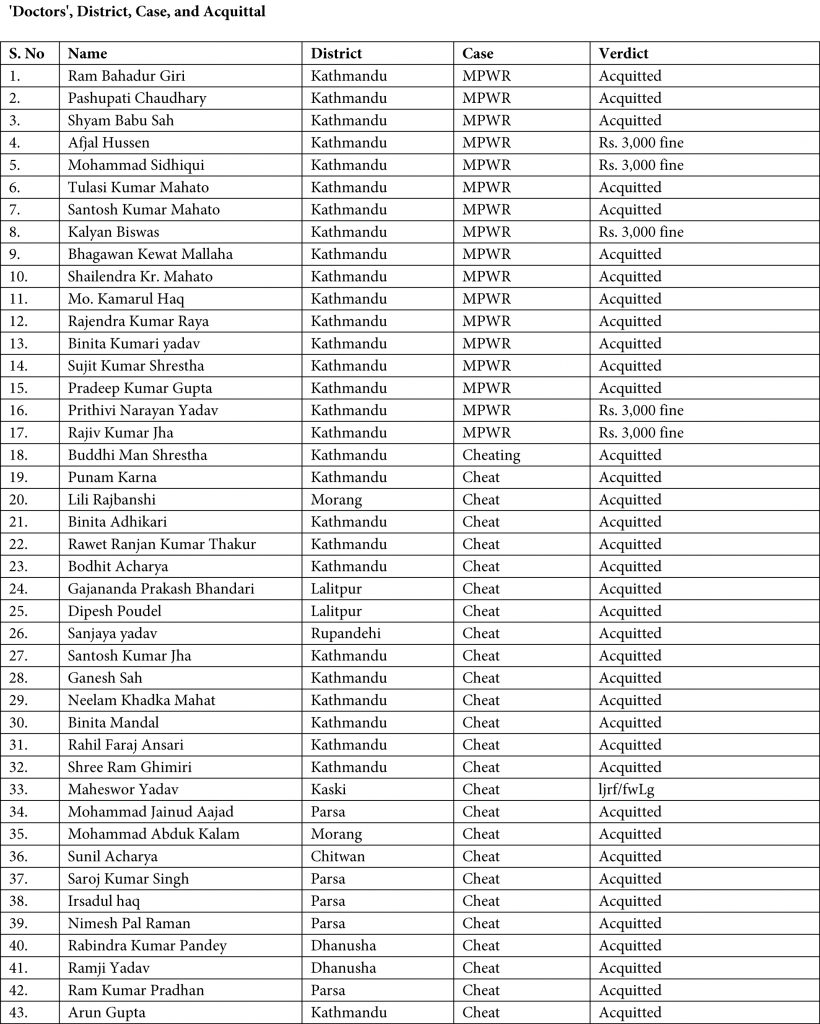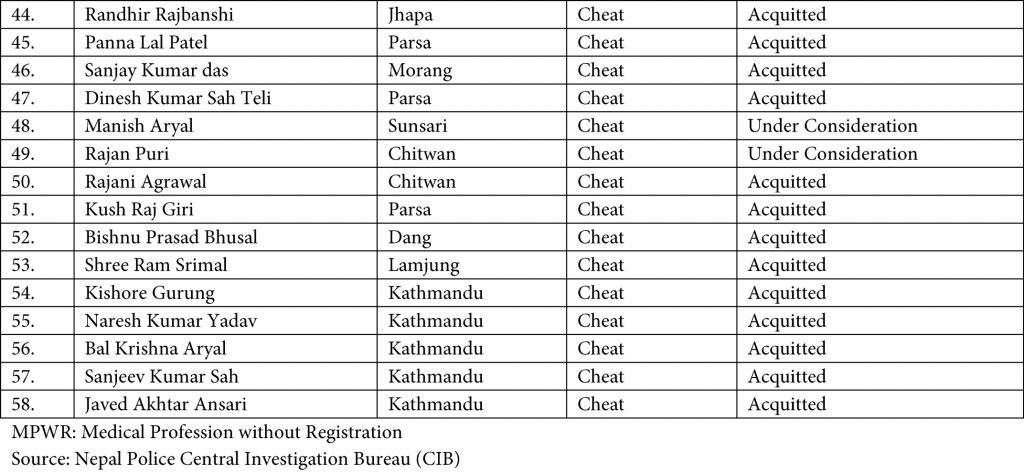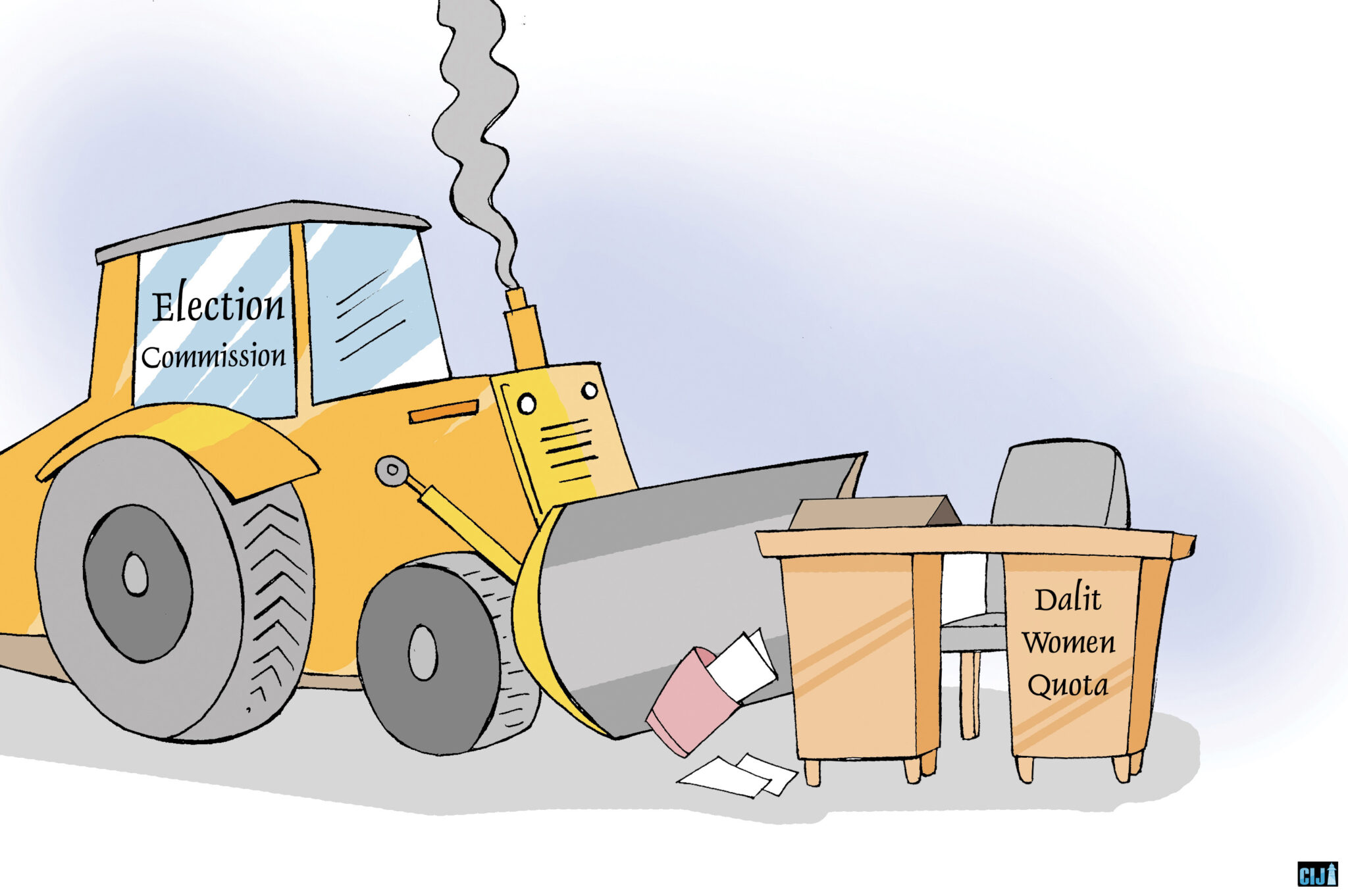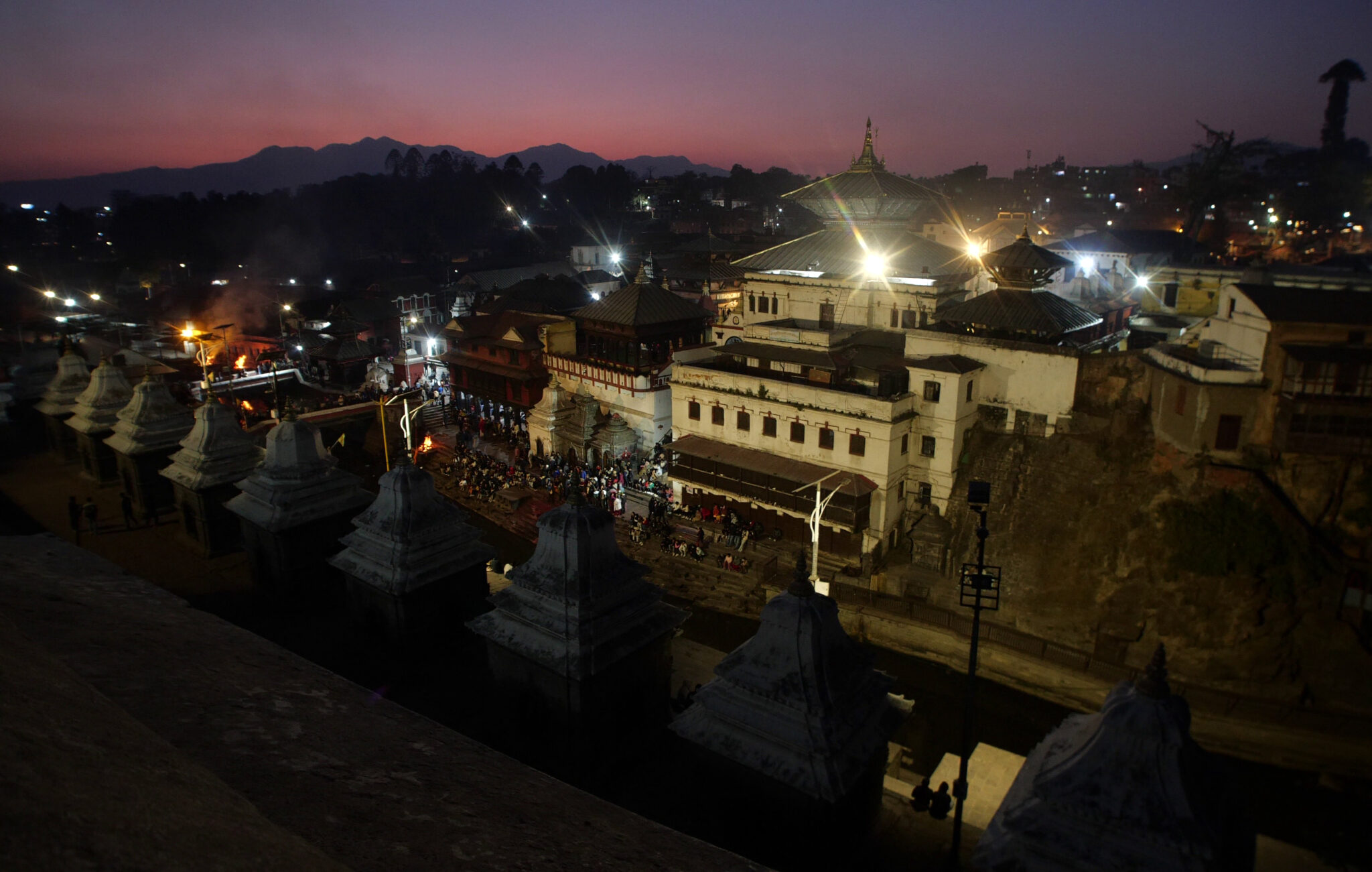Here’s a revelation of how convicts are acquitted from the courts by prosecuting them on some other charges.
-Krishna Gyawali : Centre for Investigative Journalism-Nepal
In what can be dubbed as a major crackdown on a forgery case, police arrested at least 20 ‘fake’ doctors impersonating themselves as certified doctors from different places of Kathmandu on 29th January 2018. The Central Investigation Bureau (CIB), after methodical investigation, filed cases against these charlatans at the district court. The court, instead of taking up the case seriously, acquitted several of them on bail. Some were released on Tarek after bail hearings.
Earlier, cases filed at the court against 58 fake doctors from January 2016 to September 2016 went through similar outcomes. For instance, the CIB filed a case of fraudulence against Dr. Arun Kumar Gupta, practicing at the Norvic Hospital with fake credentials that certified him of graduating I. Sc from a university in Bihar, India with an obtained mark of 480 in 1988. The district court, however, acquitted him citing lack of evidence. Gupta returned to his duty, and interestingly, his name appears on the website of Norvic Hospital.
Dr. Buddhi Man Shrestha, a dentist, was arrested for practicing with fake I.Sc certificates, which he obtained from Bihar in 1999. He did his MBBS on the basis of fake credentials. The CIB filed a case against him substantiating the evidence that Dr. Shrestha’s roll code and number were “missing” or “not found” in the record of the college. The district court, however, released him on bail. Chairperson of Kantipur Dental College, Shrestha also runs “Buddhi Man Foundation”.
Interestingly, while most of the doctors who faced charges of forgery have been acquitted, some are in the process of acquittal. These cases were guided by legal shrewdness i.e. ‘offense and charge’ were in deep contrast. To be precise, while police file cases against fake doctors charging them practicing as certified doctors, the court acquits them citing legal clarity in the definition.
The law categorically rejects any act or deed of masquerade or forgery. However, instead of charging these people of impersonating as doctors and treating patients on the basis of fake educational certificates, the police took action against them with the charge of ‘cheating’. Consequently, they get clean-chit from the court. The fake doctors arrested under “Operation Quack” are currently practicing in various hospitals.
Elaborating on the issue, Sanjib Regmi, a government attorney, said, “A government advocate cannot register a case without any evidence or claim in the charge sheet.” Regmi, also the spokesperson at the Attorney General’s Office, said, “If the investigation seems to be weak, the office can instruct the police to collect necessary evidence.”
A contrast in Crime and Case
The District Administrative Offices of Kathmandu and Rupandehi, Nepal Medical Council (NMC), and CIB initiated separate investigations soon after CIJ published a report three years ago in relation to the fake doctors. The investigation revealed that almost one thousand “doctors”, most of who repeatedly failed in the NMC entrance tests, possessed fake I.Sc certificates bearing the names of Indian colleges. The Council delved into the issue with the support of the CIB. In the course of the investigation, the NMC and CIB sought the support of Higher Secondary Education Board (HSCB) to dig out instances of forgery, including the certificates issued by colleges in India. Interestingly, out of the 809 certificates that were delved into, 109 came out to be fake ones, which the doctors possessed. Even as the police arrested 58 fake doctors right away, they preferred not to initiate any further action since most of the cases, which were filed previously at the district courts, were ineffectual. Hence, the investigation was left in a lurch.

 The NMC and the HSEB claimed that the doctors who were arrested possessed fake certificates – several of them having no record at the Indian Examination Board– from the Indian universities. Quite a few doctors, who actually studied in India, had even bought fake certificates with a raised percentage.
The NMC and the HSEB claimed that the doctors who were arrested possessed fake certificates – several of them having no record at the Indian Examination Board– from the Indian universities. Quite a few doctors, who actually studied in India, had even bought fake certificates with a raised percentage.
Two separate cases – practicing a medical profession without registering and impersonating as a doctor by cheating people on the basis of fake certificates — were filed against 58 doctors. According to Section 26 of NMC Act, no one shall be allowed to carry out medical profession without registering at the NMC. “If anyone has committed an offense against this, a person shall be punished with an imprisonment of up to three years or a fine up to three thousand rupees or both.”
Seventeen of the arrested doctors were prosecuted with this charge. In order to confirm this charge, either the names of these doctors should not have been in the NMC Registration book, or they should have been into the medical profession without registering. Likewise, the police had also filed ‘cases of cheating’ against 41 other doctors. To prove that someone has cheated or deceived, there had to be an evidence of cheating or forgery.
Questions to ponder: Why did the government fail in court on these issues? What were the weaknesses on the part of the police, government lawyers, and Nepal Medical Council? Why did the different courts issue similar verdicts? To find answers to these questions, we scrutinized 58 case-files registered at different district courts.
During the course of research, it was evident that the police had prepared a report alleging Irsad Ul Haqq, Birgunj National Medical College of ‘swindling people by collecting money from them in the name of treatment’. Similarly, Mohammad Abdul Kalam was charged with forgery case ‘of cheating Rs. 12 lakhs 70 thousand in the name of treatment’. Likewise, Dr. Sunil Acharya, who was working under the Ministry of Health in Chitwan, was charged with swindling Rs. 27 lakhs. Some 41 doctors faced prosecution on ‘fake’ charges of studying medical education on the basis of fake credentials. However, the nature of their deceptiveness remains ambiguous. Police as well as the government lawyer, in the charge-sheet, have neither mentioned the details of the fake doctors who bought certificates from India nor have they demanded action against them for presenting fake credentials to pursue medical studies.
The Muluki Ain (Civil Code) states that if a person makes frauds, gives and submits any fraudulent documents regarding property which the person has no right in, or lies something which is not true, or gives, takes, sells or exchanges some other’s property upon pretending that if it belongs to him or her, the person shall be deemed to have committed the offence of cheating.”
In the course of prosecuting the fake doctors, the police alleged them of “treating patients posing as genuine doctors having genuine certificates”. However, the police failed to submit any document or evidence to substantiate its own allegations. For instance, responding to Morang District Court’s orders regarding the case of Mohamad Abul Kalam, the National Examination Board (NEB) had stated that Kalam’s certificates were ‘in the process of investigation and certification’.
The court in this particular case gave its verdict saying, “According to the NEB’s response, it’s apparent that the police filed the case on the basis of mere assumption without verifying the credentials. Moreover, it wouldn’t be fair to conclude that the accused has amassed the amount through unfair means in the course of practicing in various health institutions.”
Likewise, the police in its charge sheet claimed an amount of Rs. 4 lakhs 68 thousand from Irsad Ul Haqq for cheating the patients in the course of treatment. Interestingly, the police said that since no victims have come to contact so far, it maintained that the victims should be getting the amount according to the law if they came forward to claim the amount.” In this particular case, the court ruled that since there have been no claims of cheating, tagging a license-holder doctor with jargons such as “cheater” would be an injustice.”
To convict a person, he/she has to cause loss to another person by way of deceiving, misrepresenting or misleading the other person with mala fide intention on the basis of fake credentials. Doctors possessing fake documents did not deceive the patients since the NMC had equipped them the license to practice or perform their duties. The Council could have initiated action against such doctors by terminating their registration. It, however, did not do so.
Without paying much attention to this issue, the police, however, prepared separate charge-sheet, which did not hold much weight. Government lawyers, too, supported the police. Sanjiv Regmi, Spokesperson of the Attorney General’s Office, admitted lack of unison among government lawyers on the issue of fake doctors. “Even the cases that were filed against fake doctors were of different nature such as some practicing without registration, and some against cheating by impersonating as doctors. This will have inconsistency during the prosecution.”
However, if reality is to be scrutinized, it seemed that everything was done on purpose. In the first phase, the police filed cases against Ram Babu Giri, Pashupati Chaudhary, Shyam Babu Sah, Afjal Hussein, Mohamad Siddiqui, Tulasi Kumar Mahato, Kalyan Biswas, Bhagawan Kewat Mallah, Shailendra Kumar Mahato, Mohamad Kamar Ul Haqq, and Rajendra Prasad Ray charging them of practicing without registration. To ascertain this allegation, these names should not have been registered at the Nepal Medical Council. However, the investigation showed that while Shailendra, Bhagawan, and Santosh Yadav had acquired a temporary license from the Council, the names of Ram Babu, Shyam Babu, Rajendra Prasad Das, Tulsi Kumar Mahato and Mahamad Kamar Ul Haqq were enlisted in the Council’s permanent Registration Book.
On January 10, 2017, the Council sent a letter to the district court confirming the names of 8 defendants in the NMC Registration book record. Dr. Pradip Kumar Gupta and Binita Yadav were proved innocent on the basis of the letter.
Besides Afjal Hussein, Mohamad Ahmed Siddhiqui and Kalyan Biswas, it was confirmed that false cases were filed against other doctors. Likewise, the district court asked Prithivi Narayan Yadav and Rajib Kumar Jha to pay a fine of Rs. 3 thousand each.
Referring to the NMC letter sent to the court on January 10, 2017, the court ruled that defendants Shailendra Kumar Mahato, Santosh Yadav and Bhawagan Kewat had received temporary certificates from the Council. Likewise, Ram Babu Giri, Shyam Babu Sah, Rajendra Prasad Das, Tulsi Kumar Mahato, and Mohamad Kamarul had received the permanent registered certificates. These doctors got rid of the cases since the police filed charge-sheets against them rather than prosecuting them on holding fake certificates.
Indecisiveness
The police indifference about the cases having the evidence makes it clear that the cases could have been quashed. Moreover, no evidence has been put forward on cases as claimed in the charge-sheet.
After the hearings of 17 doctors for ‘practicing the medical profession without registration’, the police filed cases of cheating against 41 doctors in several district courts. One among them was Buddhi Man Shrestha, who was then Prime Minister K P Oli’s dentist. The police had filed a charge sheet against Shrestha, also the Chief Executive Director of Kantipur Dental College, for swindling Rs. 70 lakh that he received as a salary of 35 months from his College. Police head constable, Ajay Bhakta Kharel’s statement at the court explains how flimsy and pathetic was the police investigation and its charge sheet. In his statement, Kharel said, “We have given the report. I have put in my signature. The investigation officer should be aware of the defendant’s fraud. The rest is in the case-file.”
There has been no sign of strong evidence anywhere on the cases filed against the doctors even as there has been no record of the certificates, which they have furnished to the police, in various universities of Bihar. The certificates were matched with the college record in India. However, no efforts were made to gather concrete evidences. The NMC, Higher Secondary Education Board and CIB could have asking India’s Examination Board to write a letter clarifying that the certificates did not match with the record. For instance, Dr. Binita Kumari Yadav’s name could not be tracked in the record of the Examination Board of India. Instead, her roll code had a different name that read Nirmala Kumari Mahato. Rather than asking for an official letter, the investigation team took a screenshot of the computer and furnished it as evidence. The evidence was deliberately made insubstantial.
Similarly, the certificate with roll code 6508 and No. 10050 furnished by Dr. Binita Kumari Adhikari, who completed I.Sc from Bihar in 1994, was also not found in the record of the Examination Board of India. Likewise, Dr. Bodhit Acharya’s certificate having roll code 416 and No. 20153 also did not match with his name. The record had Ananda Kumar Prasad’s name with the roll-code instead. Such weak evidence helped in boosting the doctors’ morale.
In his statement, Acharya said, “I furnished my I. Sc certificate of the Bihar Education Council. However, the police took the screenshot of a different board that eventually created confusion.”
What is even more surprising is that even as the police in their charge-sheet have claimed that these doctors brought certificates from India to pursue their MBBS, the police did not plead for prosecution on the basis of fake certificates. “Police claimed that those doctors pursued their MBBS studies on the basis of fake certificates. However, the police simply charged the doctors of cheating,” an NMC source said adding, “How could we expect court ruling in the government’s favor when the evidence is so weak?”
“The police have not claimed that the MBBS certificates possessed by the defendants are fake documents, but only the I. Sc and Plus Two level certificates,” Justice Krishna Murari Siwakoti has stated in the verdict. “The evidence put forth by the investigation team, which even reviewed the record of the Examination Board of India, could not substantiate the facts.”
Another ‘offense’ in the Council
The Nepal Medical Council could have initiated action against fake certificate holders according to the Clause 20 (A) of the NMC Act, which clearly states that “the Council shall remove the name of a person from the Registration book if his/her name has been registered by fraud or erroneously.” The Council could have constituted a five-member inquiry committee in order to carry out an inquiry and even could have canceled the registration.
The Council, however, did not want to go to that extent. Instead, fake doctors, who were registered at the Council, were prosecuted through CIB. Their registration could have been canceled if the court had given its verdict of fraudulence.
Clause 1 of NMC Act 17 states: “The Council may issue an order to remove the name of any registered medical practitioner from the registration book if he/she is convicted and sentenced by the court in a criminal offense involving moral turpitude.”
Several district courts have raised concern over the role of NMC on this particular issue. The Morang District Court has said that despite having the authority to initiate action against the doctors furnishing fake documents, NMC seemed to be least bothered about it. The court verdict states, “Since the case was filed at a time when there were no complaints about the solid evidence about fake certificates, and that the NMC filed the case despite taking action, could not establish fraudulence.”
The court has also drawn NMC’s attention towards the Clause 20 of the NMC Act, which has a provision of revoking a doctor’s license if he/she has acquired it through unfair means. Why did the NMC choose weaker and lengthy way to take action against the fake doctors through CIB despite having its authority to do so?
This, too, has an exciting background. Several meetings of the NMC were disrupted soon after the issue of fake doctors surfaced. With no other option in place, the NMC entrusted its Chairperson Dharma Kanta Baskota to decide on the issue. Baskota soon corresponded with the Ministry of Health seeking instruction to take “necessary action” against fake doctors. Then Health Minister Ram Janam Chaudhary decided to entrust the responsibility to the CIB to file a case of fraudulence against them. “Then after, the police started filing cases of fraudulence,” an NMC member said, adding, “We had expected a thorough investigation. You can see the outcome now.”
The NMC structure is not in a position to check irregularities within the medical sector. Among the total 19 office bearers in the NMC, the majority of them are elected. Seven government-appointed members, including its Chairman and the registrar, who also functions as a Member Secretary, are in minority. Eight members, including the Vice-Chairman, are elected. Since mostly ‘controversial and self-centered’ doctors ‘sponsor’ the election expenditure, the NMC is often dominated by these doctors.
Moreover, since the Chairperson of the Medical and Dental Association holds the post of an honorary member in the NMC, it’s not unusual for him/her to lobby in favor of the influential ‘doctors’ in line with the organizational interest. It should be noted that the NMC had protested the government’s crackdown on fake certificate holding doctors by issuing a statement. Then NMC Chairpersons, Dr. Anjani Kumar Jha as well as Mukti Ram Shrestha publicly protested the police crackdown on the doctors and even warned of “padlocking the NMC”.
‘This is immunity’
Among the cases filed against 58 doctors in various district courts for holding fake credentials, 53 of them were acquitted. The allegations against them too were not substantiated because the cases were filed sordidly. Cases on the charge of corruption against these doctors would have been strong. Moreover, 17 doctors were working in government hospitals. The police did not forward their files to the Commission for the Investigation of Abuse of Authority. Even the concerned government offices seemed to be least bothered on charging them with the strong evidence thus weakening the entire episode. Advocate Dr. Ramesh Parajuli, who did his Ph.D. on negligence in the medical sector, said, “The NMC should have coordinated with the government regarding the fake credentials.” According to him, both the NMC and the police have failed in this issue. “Even the court should have initiated the process of canceling the certificates if they were found to be possessing fake documents,” he argued.
Police initiated an investigation against 809 doctors on the issue of possessing fake certificates. Initially, the police confirmed that only 109 doctors were having fake credentials. However, the police filed cases against 58 only out of which five were confirmed to be partial guilty.
Advocate Dr. Sushil Koirala, who deals with doctor’s professional conduct, is of the opinion that the intention to file a case on a different issue rather than prioritizing on the concerned legal misdeed is to acquit them eventually. “This is like filing a case on cheating against a valid license-holding driver for a hit-and-run offense.” Dr. Koirala said that the number of doctors with fake certificates is much higher than estimated. “The irony is that a regulatory body like NMC is very much like a professional organization,” he concluded.



